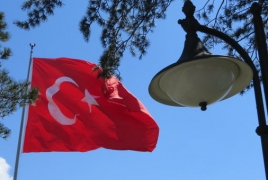Turkey’s interim government approved August 29, 2015 - 11:47 AMT PanARMENIAN.Net - President Recep Tayyip Erdogan on Friday, Aug 28, approved an interim government that will lead Turkey into a new election in November, paving the way for two legislators from Turkey's pro-Kurdish party to take up ministerial posts for the first time, the Associated Press reports. Prime Minister Ahmet Davutoglu was tasked with forming a caretaker government until an election scheduled for Nov 1, after he failed to form a coalition government following an inconclusive vote on June 7. Two opposition parties refused to participate in the 26-member power-sharing Cabinet, forcing Davutoglu to fill ministries allocated to the opposition with independent figures. Three legislators from the pro-Kurdish People's Democracy Party, or HDP, were also invited to join the Cabinet and two of them accepted, as did a prominent member of Turkey's nationalist party who broke ranks with his party. Davutoglu said HDP legislators Muslum Dogan and Ali Haydar Konca will become ministers in charge of development and of relations with the European Union. The HDP, which grew out of the Kurdish nationalist movement, has broadened its appeal to attract leftist and liberal votes from across Turkey. The two legislators take ministerial posts after the party, for the first time, managed to pass a 10 percent minimum vote threshold required for it to be represented in parliament in the June election. In the past, several of the HDP's predecessors were disbanded for alleged links to Kurdish rebels. Tugrul Turkes, a deputy chairman of the Nationalist Movement Party, who caused a storm by joining the Cabinet despite his party's strong opposition, was made a deputy prime minister, Davutoglu announced. Members of the ruling party kept three other deputy prime ministerial posts. Academician Aysen Gurcan, who was named the minister in charge of women and family affairs, becomes the first member of Turkey's Cabinet to be dressed in Islamic-style head-covering. The Islamic-style headscarves were banned in schools and official settings in Turkey until the ruling party gradually relaxed those rules. Davutoglu also appointed Istanbul's police chief Selami Altinok as interior minister. The post of foreign minister went to the ministry's undersecretary, Feridun Sinirlioglu. The ruling party lost its parliamentary majority in the June 7 election for the first time since 2002. The main opposition accuses Erdogan of triggering a new election in the hope that the ruling Justice and Development Party, or AKP, which he founded, can win back its majority and rule alone. Opinion polls, however, suggest that the new election may not reverse the AKP's losses and another hung parliament is a possibility. Some 60 soldiers, police and village guards and 15 civilians have been killed since July in renewed conflict between the outlawed Kurdistan Workers' Party, or PKK, and the security forces, which has wrecked a 2 1/2-year-old peace process with the Kurds. State-run media say around 90 PKK rebels have also been killed. Opponents have accused Erdogan of escalating the conflict against the PKK in a bid to win nationalists' support and discredit the pro-Kurdish party, whose gains in the June election deprived the ruling party of its majority. The government denies the accusations. Authorities said a total of 192 Azerbaijani troops were killed and 511 were wounded during Azerbaijan’s offensive. In 2023, the Azerbaijani government will increase the country’s defense budget by more than 1.1 billion manats ($650 million). The bill, published on Monday, is designed to "eliminate the shortcomings of an unreasonably broad interpretation of the key concept of "compatriot". The earthquake caused a temporary blackout, damaged many buildings and closed a number of rural roads. Partner news |